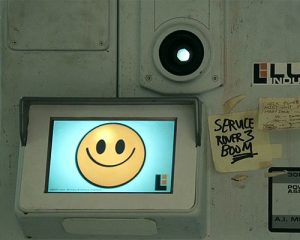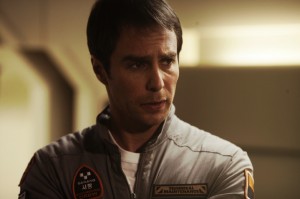This essay contains spoilers. There, you’ve been warned. Don’t come whining to us later.
As a writer, it’s easy to criticize. You can throw around rhetoric, slather your ideas in half-baked statistics, or distract your readers with ostensibly funny, semi-autobiographical stories about being dragged through the mall, crying, sopping wet, with your pants around your ankles, because you happened to get bitterly drunk on your birthday and just maybe you wanted to “piss in the Fountain of Youth. And then maybe in Hot Topic™.”
My relatively sober, out-on-bail-pending-trial point being that writing provides a safe place to hurl judgments from, especially since the advent of this “internet” doohickey [1]. This de facto high ground isn’t bad in and of itself, but it does provide the perfect venue for wordsy dipsh*ts like myself to take the low road. It’s easier to write about things you don’t necessarily like.
I can only remember one complimentary article I’ve actually written, and it was about how much I love McDonald’s. And even in that one, it wasn’t motivated so much by my love of a domineering fast-food giant, as it was by a particularly tasty parfait and the fact that I want to slo-mo slap Morgan Spurlock so hard that his mustache explodes off of his face like a 4th of July home video made by the Wachowki Brothers.
I mention all of this for the simple reason that I recently watched “Moon,” and it was great. I liked this movie the way I dig white guys who play the trumpet and pretty girls who roll their own cigarettes. It was a quality of weird that doesn’t just scream for your attention. I never got the feeling that the director had this pressing desire to be recognized as “different.” He just had a good story to share, and when you have one of those that isn’t slathered in ego or agenda, it’s about all anyone has a right to ask for.
I went into this movie with relatively low hopes, on the grounds that most indie films are a sort of protracted, self-congratulatory wank about how the director didn’t even need to finish film school, because he already knows how take lots of sweeping shots of people with bangs smoking during breakfast. Well, for several reasons, “Moon” and I got along just fine.
At this point, I should probably mention that you should just stop reading and go watch the movie. I don’t want to spoil it for you. But hey, you know what? It’s your life, man.
This was a small-scope movie produced on a small budget, which brings the sort of chicken-egg question: did the budget fortuitously influence the story, or did the story ingeniously call for a small budget? The truth a) probably doesn’t matter, at this time and date, and b) I actually sort of wish I didn’t want to know. In this case, maybe it’s just enough that it was a good movie. Or maybe that’s always enough [2].
The general mental picture of an astronaut that most of us have is that of a slick, crew-cut professional with copious amounts of The Right Stuff. Conversely, “Moon”‘s protagonist, Sam Bell, is a slightly dazed sh*tkicker who has clearly been out in space for too long. He’s the sole worker, managing a moon-based facility that mines He3for a private corporation in the future.
Sam does his work in the intensely personal, quirky way that people will when work is all they have. He’s named each of the moon rovers he oversees, and barely refers to most of his instrumentation. He hits buttons without bothering to look first; nor does he bother to check the doodles, forgotten notes, photos, and knick knacks that he’s scattered over most available surfaces. With his massive beard and long hair, he looks and acts more like a stoned trucker than anything else.

Due to a glitch with the satellite uplink that allows him to speak with people on Earth, his sole company appears in the form of a surprisingly likable robot named Gerty. Gerty was one of the things I liked best about this film. He wasn’t a squawking, USB-capable cutefest like R2D2, and he wasn’t a HAL-like menacing red bulb whose every solution to every problem was to lock people up and/or launch them into space. If anything, he reminded me of an old Macintosh.
The director, Duncan Jones, never hammed it up with gags about machines taking things too literally or not being able to compute human emotions [3]. A small screen on Gerty’s front would feature a quantized emotion in response to things Sam said or did, in the form of a smiley face, frowny face, tear face, etc. It seems silly, until you realize that emoticons would be exactly the sort of efficient answer that engineers would come up with to address a person’s innate need for real human interaction.
Now, again, I want to urge you to just watch the damn movie before I ruin it. If we assume a) a normal, randomized distribution, and b) that amazon.com is anything to go by, then chances are that you’re watching something vampire-related and vaguely dumb. So take a break for just a little while and watch something where the evolution of the character doesn’t involve sparkling, brooding abstinence, or turning into a fat dog.
The twist in “Moon” is shades of “The Prestige.” The corporation running the facility has decided to cut down on personnel costs by cloning a bunch of Sam Bells, since the first one worked out pretty well. They’re all kept neatly frozen down in the basement, with a set of clothes and beginning memories that match the originally Sam Bell’s pretty perfectly. Also, it turns out, that 3 year contract wasn’t arbitrary; 3 years is simply the amount of time that your average clone lasts, before it begins to break down and needs to be replaced. Partially because of his diminishing faculties, our Sam Bell gets into a rover accident on the lunar surface, which leads Gerty to break a new one out of storage.
We wake up with the character, we see him ask Gerty questions, get suspicious, and eventually go out to investigate the site of his rover crash. And it’s only then that anybody can realize what’s happened: there are at least two Sam Bells, and possibly a lot more. It was a pretty refreshing change from the foregone conclusions of 95% of what we watch today. Of course, there was also 0% of the Michael Bay explosions that we usually see, but I did say this movie had its flaws.
The strength of this movie – for me, at least – lay in the interaction between the two clones, one of whom was our familiar, space-dazed miner of three years standing, while the other was a sharp, angry, aggressive astronaut, still fresh after kicking the crap out of the rest of his class in Flight School. The differences between them are clear, but organic, and it’s easy to see how 3 years in space, alone, may even have been good for man that starts out as high-octane prick with a temper.
The two clones don’t gawk or forehead slap, and there’s no record scratch to let us know that this right here is a really zany moment! In fact, they avoid each other at first. They both realize, to some degree, what the existence of the other implies about themselves, and they deal with it in a typically real and human way: by pretending not to think about it and puttering around without showering. Eventually, however, the two clones get into it, and actually kick the teeth out of each other.

The newer, angrier Sam can’t stand the older one’s vague obtuseness and constant denial that anything is wrong. And the older Sam, for his own part, is nicer and more patient than he used to be, but he’s definitely no longer firing on all cylinders. The younger Sam reveals the sort of man that first came to the moon, and the older one is a pretty good picture of how he ends up. It’s an ugly tradeoff, but “Moon” doesn’t really purport to be nice.
As with everything that doesn’t involve me saucily staring at the camera while removing items of clothing, there are always downsides. The set, while incredibly well done, gets really static and boring after a while. The junkie in me kept hoping that Gerty would do something robotically evil – but this is the same part of my personality that walls my character into a 2×2 ft. room when I play “The Sims.” So the junkie can probably be pretty safely ignored for now. But make no mistake, this is a slower sort of movie, and you do have to pay attention.
The idea of a corporation doing something as inhumane as stocking and slaughtering clones is a little silly, to me. Not that most corporations wouldn’t do it if they could get away with it. On paper, it’s just good business. But I also know that most massive companies are smart enough to realize the sort of legal and P.R. risks they’d be taking by doing something like that. It’s the sci-fi equivalent of tying a lady onto train tracks and then standing around and twisting your mustache. Corporations aren’t pleasant entities, but they’re not that cartoonishly stupid, either.
So if there was some barbed meta-commentary about the inhumanity of Big Money, I willfully chose to ignore it. It would have taken away from a steadily paced, subtle story about a guy who’s lucky or unlucky enough to meet himself in some of the more surreal circumstances imaginable.
Now tell me that doesn’t sound interesting.
[1] I hear it runs on black magic.
[2] I’ve got myself so confused now that I just put my shoes on my hands and stuffed my scooter helmet down the front of my pants. The shoes I might fix, but the helmet… looks quite flattering.
[3] Which, at this point, gets categorized with “slipping on banana peels” and “movies about rich people from New York that move to the rural south” under the heading “Things that end with a fart sound.”

Seems “Moon” by Duncan Jones was ‘copied’ from the italian indie movie “Eutamnesia” by Patrick Rizzi
Quoting from imdb >>>
“I really liked ‘Moon’ when I first saw it. But now I read that it was probably copied from Eutamnesia, an indie italian movie.
Here’s the comparison video:
http://www.youtube.com/watch?v=O09qW_DwoRo
I’m kind of angry with Duncan Jones right now as from what I understood he never mentioned Eutamnesia before and bragged Moon’s story as his own.”
Please, not stupid comparisons about quality: obvious, “moon” had budget 5.000.000 of dollars against a low budget student movie